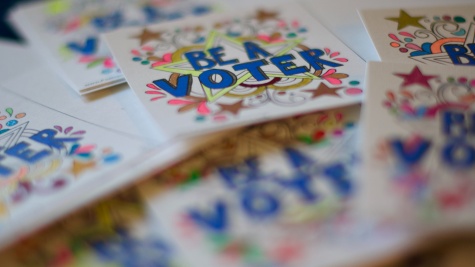Building voter trust on social media
Election Officials’ communication strategies during the 2022 election
The MIT Election Data and Science Lab helps highlight new research and interesting ideas in election science, including through research grants under our ongoing Learning from Elections program.
Our post today was written by Thessalia Merivaki and Mara Suttman-Lea, based on their ongoing research funded by this program. The information and opinions expressed in this column represent their own research, and do not necessarily represent the opinions of the MIT Election Lab or MIT.
In this project, we assess the election information ecosystem cultivated by state and local election officials (EOs) to build trust in the election process and increase confidence in vote accuracy.
We track, monitor, and analyze over 50,000 organic social media posts from all state and local EOs who operate an official social media account across three major platforms - Facebook, Instagram, and Twitter - between September 10 and November 30, 2022. We specifically aim to assess trust-building communication strategies as well as direct and indirect responses to misinformation. This summary presents an overview of the trust-building messaging campaign landscape and observations on prominent misinformation responses by state and local election officials.
Assessment Approach
In partnership with the National Conference of Citizenship, we track and code messages shared by state and local election officials who operate an official social media account on Facebook, Instagram and / or Twitter between September 10 and November 30, 2022. Our list includes 123 state EO accounts and over 1,000 local EO accounts across these platforms. During this time frame, we have collected 50,000 organic posts, which we code based on 7-thematic category taxonomy, using quantitative manual content analysis tools. (For details on our methodology, see our project overview here.)
We ground our assessment on efforts to communicate to voters a consistent message: that election officials are trusted sources of election-related information. In 2022, states have coordinated efforts with national organizations like the National Association of Secretaries of State (NASS) to promote and amplify this message on social media using the #TrustedInfo2022 campaign. Many states adopted similar hashtag strategies on their social media communication efforts, which we also take into account in our assessment.
Within this trust-building campaign, we monitor and assess misinformation response strategies, particularly those aiming to boost accurate information either pre-emptively or in real-time. As such, we attempt to capture efforts to inoculate voters against misinformation, as well as efforts to debunk misinformation about specific processes that arise during the course of the election cycle.
Topline Findings
(Coding is ongoing.)
- State EOs are more consistent messengers than local EOs.
- There are clear disparities in resources and expertise among EOs, both at the state and local level.
- Cross-platform differences create challenges in sharing the same content to voters.
- Key demographics utilizing each platform may miss important information.
- Weak coordination between state EO and local EOs communication strategies.
- Especially in states with robust communication campaigns, there is limited adoption at the local level.
- Some local EOs do share content prepared by the state EO communications officer.
- Key communication tools:
- Videos / images / office logo / links directing to an election website.
- State / locality-specific hashtags.
- Usage of keywords: “safe”, “secure”, “integrity,” “trust,” “accountable,” “professional,” “counts,” etc.
- Trust & Misinformation strategies:
- Trust-building: messages about how election processes are safe / secure - EOs are trusted sources; #TrustedInfo2022 and state-specific hashtag campaigns.
- Debunking misinformation: messages addressing misinformation explicitly in real-time.
- Inoculation from misinformation: messages with information about how to spot misinformation; messages with information about how processes work, followed by trust-building messages.
Building Trust with Hashtags: #TrustedInfo2022 and Beyond
(This list is not exhaustive, as coding is ongoing.)
- Eight states pledged to incorporate #TrustedInfo2022 into their social media communications: Arizona, Idaho, Iowa, Louisiana, Mississippi, Montana, New Jersey and Rhode Island.
- Arizona was the most consistent user of the hashtag across all platforms.
- Eleven states used the #TrustedInfo2022 hashtag, highly inconsistently and infrequently, without making an official announcement, which was recommended by NASS: Delaware, Maine, Maryland, New Hampshire, New Mexico, Oklahoma, Oregon, Tennessee, Texas, Vermont and Washington.
- North Carolina stopped using the hashtag in July 2022 and started using #MyVoteCountsNC consistently in all social media communications.
- Very few North Carolina LEOs adopted the hashtag in their communications.
- Among the most prominent hashtag campaigns were Colorado’s #TrustedInfoTuesday.
- Whereas the state EO in Florida did not use any specific hashtag, Florida LEOs used #TrustedInfo2022 the most, although not uniformly, along with #ElectionExpertsFL.
- Miami-Dade, Florida used one of the most creative messages, incorporated in all visual content on their social media posts: “Be involved. Be informed. Be election ready, “ followed by #Resilient 305.
Combating Misinformation: Representative Examples
(Coding is ongoing.)
- Inoculating voters against misinformation:
- Wisconsin’s Election 101 video series, with information about election processes, including voting security.
- Colorado’s #TrustedSource videos with steps on how to spot misinformation, notifying voters to be ”aware of bad election information online meant to confuse and divide voters. Colorado’s elections are secure, accurate, and accessible!”
- Iowa Secretary of State emphasizing that the Iowa structure has “checks and balances.”
- Weber County, Utah election official reminding voters that “If it’s not gov, it’s not us.”
- Debunking misinformation:
- Iowa Secretary of State issuing “Election Misinformation Alert” posts, explicitly addressing misinformation claims and reminding voters to look to trusted sources of information.
- Michigan Secretary of State lagging misinformation posts shared on social media with a “FALSE” stamp and setting the record straight.
- Lucas County, Ohio election official engaging on Twitter with an individual claiming that Ohio requires voter ID to vote: “We are doing our best to correct misinformation on voting, something you did in your post.”
- Weber county, Utah election official used a “if it’s not gov, it’s not us” message in their post.


